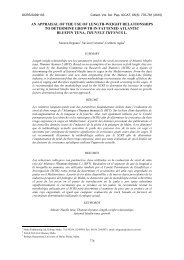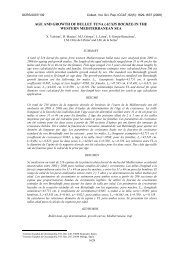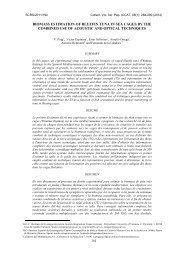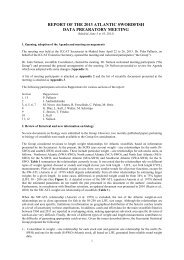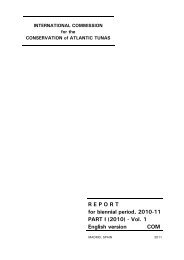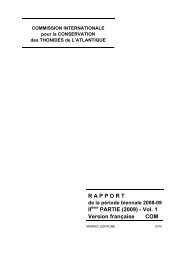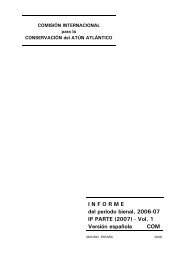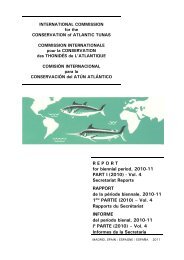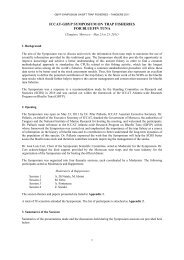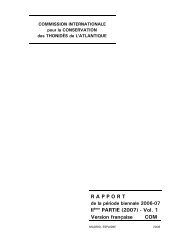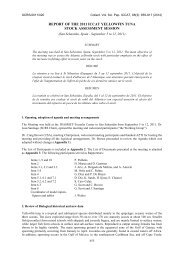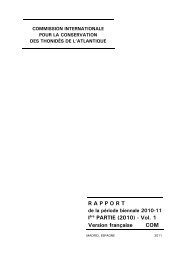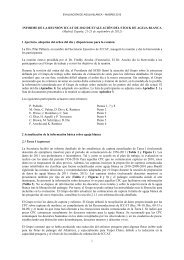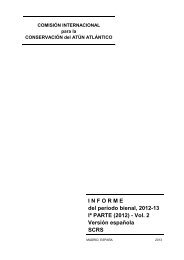E - Iccat
E - Iccat
E - Iccat
You also want an ePaper? Increase the reach of your titles
YUMPU automatically turns print PDFs into web optimized ePapers that Google loves.
PWG REPORT<br />
During its 2003 review, the Commission was reminded that the European Community, an ICCAT member, has<br />
imported swordfish from Mauritania in 2002 and that vessels flagged to Mauritania and carrying swordfish and<br />
bluefin tuna have attempted to call at EC ports in the recent past. To date, Mauritania has reported no catch data<br />
to ICCAT. In addition, the Commission has not established a catch limit for Mauritania for any ICCAT stock.<br />
Any harvests of ICCAT species by Mauritanian flag vessels are taking place outside the ICCAT management<br />
regime. Thus, the Commission regarded this trade and landing information with concern.<br />
The Commission requests the Government of Mauritania to provide ICCAT with information regarding the<br />
export and landing activities mentioned above as well as any other Atlantic swordfish or tuna harvests by its<br />
vessels, including the geographic area of the catch. The Commission also requests information on measures<br />
Mauritania has in place to ensure full implementation of ICCAT´s conservation and management measures,<br />
including details on monitoring, control, and surveillance programs. Relevant information concerning these<br />
matters should be submitted to ICCAT as soon as possible so that the Commission can take it into consideration<br />
during its next meeting, scheduled for November 15-21, 2004, in New Orleans, Louisiana, USA.<br />
For your use and information, I am enclosing herewith a Compendium of ICCAT´s Management<br />
Recommendations and Resolutions. Please note that it includes an important new instrument entitled Resolution<br />
by ICCAT Concerning Trade Measures [Ref. 03-15], adopted by the Commission at its 2003 meeting. The 2003<br />
Resolution both broadens the scope of ICCAT´s existing trade regime and establishes a more transparent process<br />
for the application of trade restrictive measures when such measures are warranted. The Commission will use<br />
this new Resolution for the first time in 2004 to guide its review of fishery related activities in the Convention<br />
area.<br />
Thank you for your attention to this important matter. Please accept assurances of my highest consideration.<br />
5.13 Letter to Netherlands Antilles: Advising no consensus to grant Cooperating Status; expressing strong<br />
concerns regarding bigeye tuna catches<br />
The International Commission for the Conservation of Atlantic Tunas (ICCAT) met for its annual meeting from<br />
November 17-24, 2003, in Dublin, Ireland. At that meeting, the Commission conducted its annual review of<br />
fishery related information for the Convention area pertaining to both ICCAT members and non-members.<br />
During its 2003 review, the Commission received information that there are five vessels flagged to the<br />
Netherlands Antilles operating in the Convention area. The fleet consists of large-scale tuna vessels, three of<br />
which are purse seiners and two of which are baitboats. Catch data as reported by the Netherlands Antilles<br />
indicate significant harvest levels of bigeye tuna beginning in 1996 and continuing through 2002, the last year<br />
for which data were available.<br />
The Commission welcomed the fact that the Netherlands Antilles has been reporting its catch data and vessel<br />
information to ICCAT and has been participating in ICCAT meetings as an observer. Nevertheless, the<br />
Commission expressed serious concern about the high catch levels of bigeye tuna by vessels flagged to the<br />
Netherlands Antilles. The Commission wishes to stress that ICCAT members have been operating under a strict<br />
management regime of time and area closures, capacity limitations, and catch limits since the late 1990s. The<br />
Commission would like to see significant reductions in the bigeye tuna catch levels of the Netherlands Antilles.<br />
In considering the request of the Netherlands Antilles for Cooperating Status, the Commission could not reach a<br />
consensus on the matter at its 2003 meeting. As you may know, the category of Cooperating Party, Entity or<br />
Fishing Entity has been in existence within the Commission since 1994. Those that are granted Cooperating<br />
Status formally accept the obligation to implement fully the conservation and management measures adopted by<br />
the Commission and to abide by data and other reporting requirements. I would draw your attention to a<br />
document adopted in 2003 entitled Recommendation by ICCAT on Criteria for Attaining the Status of<br />
Cooperating Non-Contracting Party, Entity, or Fishing Entity in ICCAT [Ref. 03-20], (enclosed). This measure<br />
clarifies the process for granting Cooperating Status and specifies the information that must be provided by<br />
applicants to receive consideration.<br />
In support of the Commission’s review of requests for Cooperating Status under the new Recommendation, I<br />
would ask that the Netherlands Antilles write to ICCAT as soon as feasible confirming its continued interest in<br />
receiving Cooperating Status and addressing directly the requirements contained in paragraphs 3 and 4 of said<br />
Recommendation. Toward that end, specific information on the monitoring, control, and surveillance scheme for<br />
your fleet should be provided.<br />
279



